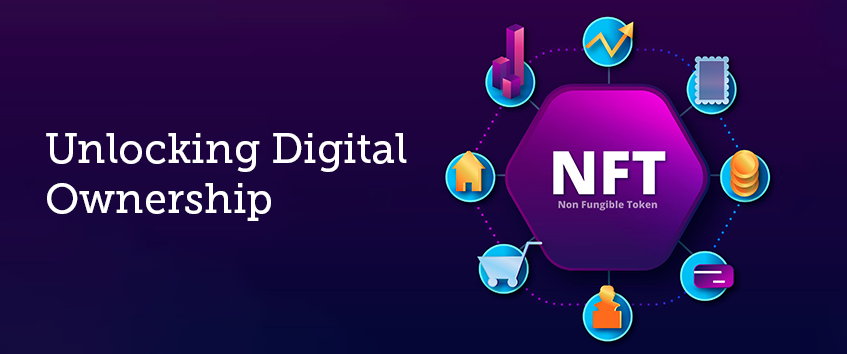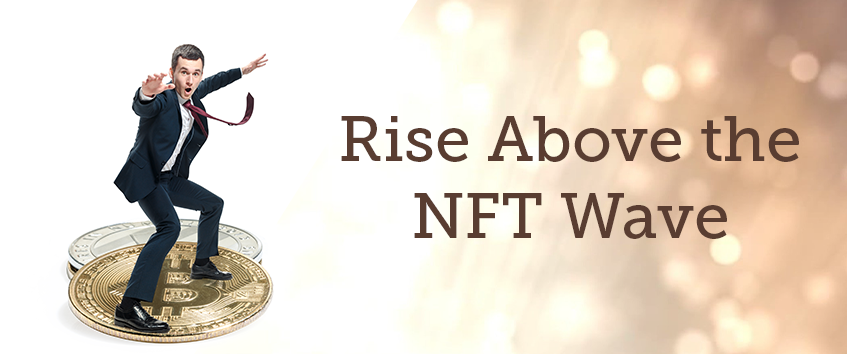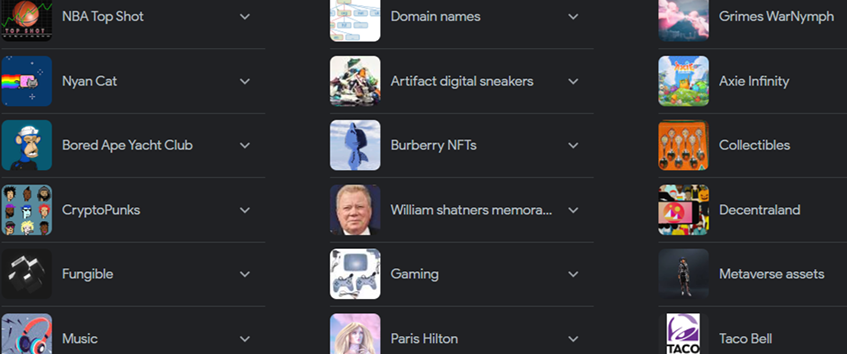NFTs and its Impact on Digital Marketing
October 31, 2023
New technologies are constantly reshaping many industries in the ever-changing digital landscape. Non-fungible tokens (NFTs) are one such idea that has attracted a lot of interest. NFTs have given inventors, collectors, and companies new opportunities. Let’s examine the relationship between NFTs and digital marketing, including its advantages, tactics, difficulties, and potential future developments. As the world steps into 2024, let’s see how well it helps reshape the digital marketing landscape in this new era.
Understanding NFTs
What are NFTs?
NFTs are digital tokens that represent ownership of a unique item or piece of content using blockchain technology. Unlike cryptocurrencies such as Bitcoin or Ethereum, which are fungible and can be exchanged on a one-to-one basis, NFTs are indivisible and cannot be exchanged on a like-for-like basis. Each NFT has a distinct value and specific information that makes it one-of-a-kind.
How do NFTs work?
NFTs are built on blockchain platforms, most commonly Ethereum. The blockchain acts as a decentralized ledger, recording the ownership and transaction history of each NFT. This ensures authenticity and provenance, making it nearly impossible to counterfeit or duplicate NFTs.
NFTs in Digital Marketing: A Paradigm Shift
1. Monetizing Digital Assets
NFTs enable digital marketers to monetize their content in ways previously unimaginable. Artists, musicians, writers, and content creators of all kinds can tokenize their work, allowing them to sell it directly to their audience. This eliminates the need for intermediaries, empowering creators to have more control over their earnings.
2. Enhancing Brand Visibility
NFTs offer a unique opportunity for brands to engage with their audience on a deeper level and this will become an aid to its brand strategy. By creating limited edition NFTs, brands can reward loyal customers, create a sense of exclusivity, and foster a community around their products or services. This can lead to increased brand loyalty and advocacy.
3. Enhanced customer engagement
NFTs offer a unique way to engage with customers through interactive and immersive experiences, fostering a deeper connection with the brand.

4. Tokenized Collectibles and Merchandise
NFTs have given rise to a new form of digital collectibles. Brands can create tokenized versions of their products, turning them into unique, collectible items. This not only adds value to the product but also provides an additional revenue stream for the brand.
5. Immersive Virtual Events
With the advent of virtual reality and the metaverse, NFTs play a crucial role in creating immersive experiences. Brands can use NFTs to grant access to exclusive virtual events, conferences, or workshops. This allows for a more interactive and personalized engagement with the audience.
6. Influencer Marketing
NFTs are reshaping the landscape of influencer marketing. Influencers can create and sell their own NFTs, providing a new revenue stream beyond traditional brand partnerships. Additionally, NFTs can be used to reward loyal followers or as part of giveaways and contests.
7. Diversification of revenue streams
NFTs provide an additional revenue stream for creators and businesses, generating income through sales, royalties, and licensing.
Strategies for NFT Digital Marketing
Creating unique and valuable NFTs: To stand out in the crowded NFT marketplace, brands should focus on creating high-quality, unique, and desirable digital assets that resonate with their target audience.
Leveraging social media platforms: Brands can leverage popular social media platforms to promote their NFTs, engage with their audience, and build a community around their brand.

Collaborating with influencers: Partnering with influencers who align with the brand’s values and target audience can help amplify the reach and impact of NFT digital marketing campaigns.
Hosting virtual events and auctions: Hosting virtual events and auctions can create a sense of exclusivity and urgency, driving excitement and demand for the brand’s NFT offerings.
Challenges and Considerations
While NFTs present exciting opportunities for digital marketing, it’s important to approach them with caution. The market is still relatively young and can be volatile. Brands and creators should carefully consider factors such as intellectual property rights, legal implications, and environmental concerns associated with blockchain technology. While NFTs present exciting opportunities, there are several challenges that marketers may face when incorporating them into their digital marketing strategies:
Market Instability: The NFT market is known for its roughness. Prices of NFTs can fluctuate dramatically in a short period, which may make it difficult for marketers to predict the value of their NFT campaigns.
Educating the Audience: Many consumers are still unfamiliar with NFTs and how they work. Marketers need to invest time and effort in educating their audience about NFTs, which can be a barrier to adoption.
Legal and Copyright Issues: Ensuring that creators have the legal rights to tokenize and sell their content can be complex. Marketers and creators must navigate copyright laws and intellectual property rights to avoid legal issues.
Environmental Concerns: The blockchain technology used for NFTs, particularly on platforms like Ethereum, consumes a significant amount of energy. This has raised concerns about the environmental impact of NFTs, which may deter environmentally-conscious consumers.

Over-Saturation and Quality Control: The rapid growth of the NFT market has led to a flood of new NFTs, varying greatly in quality and content. This oversaturation can make it harder for marketers to stand out and for consumers to differentiate valuable NFTs from low-quality ones.
Scalability Issues: Some blockchain networks, especially Ethereum, have faced scalability issues due to high demand. This can result in slow transaction times and high gas fees, making NFT transactions less efficient and cost-effective.
Marketplace Fragmentation: There are numerous NFT marketplaces available, each with its own user base and unique features. Marketers need to carefully choose which marketplace to use and consider how it aligns with their target audience.
Lack of Interoperability: Currently, NFTs on different blockchains are not easily interchangeable. This lack of interoperability means that marketers and creators may need to choose one blockchain over another, potentially limiting their audience.
Speculative Nature of the Market: Many participants in the NFT market are driven by speculation rather than a genuine interest in the underlying content. This can lead to bubbles and bursts, potentially impacting the long-term viability of NFT marketing.
Sustainability Concerns: As mentioned, the energy consumption associated with blockchain technology raises sustainability concerns. Marketers may face backlash from environmentally-conscious consumers if they do not address these concerns.
NFT in Market Place
If you are interested in cryptocurrencies you can try NFTs. One place where you can buy and sell NFTs is the NFT Marketplace. Depending on the area of interest, there are numerous successful NFT marketing platforms. These have the power to thrill people and bring in money for businesses. It is a great idea to research which blockchain platform to use before you start buying NFTs or selling your creations.

Collectibles are the most well-liked NFT artwork examples. An NFT collectible is a member of a group of distinctive, randomly created characters. No two collections are the same, and each collectible may only be owned by one individual at a time with blockchain technology used to verify authenticity. Not simply illustrations, but any work of art, can be represented using NFTs. Additionally, NFTs that represent music, albums, videos, or movies can be purchased, amassed, and traded. Play-to-earn models are another option for NFT-based games, allowing players to acquire tradable in-game NFT objects or bitcoin with actual monetary value.
In short, you can find NFT marketplace platforms that are very general, specialized marketplaces such as gaming, and others that are by invitation only. Your NFT interests and whether you are buying or selling will influence which marketplace suits your needs. To choose the right NFT marketing agency for your project, businesses should consider factors such as experience, portfolio, reputation, and pricing. It is important to work with an agency that understands the unique needs of the business and has a proven record of success in NFT marketing.

From Clicks to Collections-Impact of NFT
As we step into 2024, NFTs are poised to revolutionize digital marketing. By embracing this technology, brands and creators can unlock new revenue streams, engage with their audience in innovative ways, and stay at the forefront of the rapidly evolving digital landscape. However, it is crucial to approach NFTs with a strategic mindset, understanding both their potential and their challenges. As with any emerging technology, staying informed and adaptable is key to reaping the full benefits of NFTs in digital marketing.
So Try to Turn Your Digital Interactions into Assets
